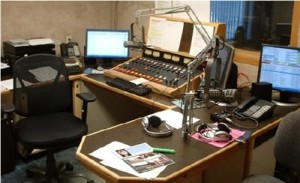FREE FLOW OF INFORMATION
An article from the Journal du Cameroun
In view of the terrorist attacks that have led to a deterioration of the humanitarian and security conditions in regions of the country, and from which thousands of Cameroonians have fled their homes, this radio project aims to improve the prevention of conflicts and inter-community dialogue between refugees and host communities, and educate young girls and boys who are vulnerable to terrorist recruitment.

One of the radio control rooms © Rights reserrved
UNESCO and its partners have mobilized the community and four local radio stations in the process of building peace through education. The stations were chosen for their ability to reach the most remote areas by providing information and educational programs in local languages.
“A UNESCO study on the situation in these densely populated areas reveals that misunderstandings among different communities and between them are one of the main problems,” said Cletus Tabe Ojong, Programme Specialist Communication and Information at Regional Office of UNESCO in Yaoundé.
Personnel of the four stations, Echoes of the Mountains of Mokolo, Radio Sava de Mora, Radio Kousseri and the regional station based in Maroua, were trained in the development of local programs on peacebuilding, mediation, prevention and resolution of conflicts, education for nonviolence and dialogue and intercultural and interfaith reconciliation.
The four stations produce over 60 programs on substantive issues to create links between the different communities. On the air, members of rural communities discuss issues related to community inclusion and non-violent conflict resolution. In Mokolo, an area surrounded by villages regularly hit by terrorist attacks, the auditors become aware of the impact of programs related to peace and non-violent resolution of local conflicts. Education programs for peace not only provide knowledge on the culture of peace, but also transmit the skills to recognize and defuse potential conflicts, and to actively promote and build a culture of peace.
(Article continued in the right column.)
(Click here for the French version of this article.)
African journalism and the Culture of Peace, A model for the rest of the world?
How can peace be promoted by radio?
(Article continued from left column)
“The themes highlight the challenges we face given the current situation in our region,” said Abdurahman Saidou, a member of the regional branch of the Cameroon Association for Interreligious Dialogue, committed to the construction of a peaceful coexistence between Muslims and Christians.
Among the high-impact programs are local news, magazines, micro-programs, live debates and discussions in the national languages. Some programs are presented by Youth Ambassadors for Peace, identified and trained by UNESCO to raise awareness among their peers at school and during extracurricular activities. In addition, listening groups are being created by the youth ambassadors to encourage mobilization, dialogue and action in structures of formal and informal education.
The project, implemented from March 2015 to March 2016, is a joint initiative of UNESCO, UNDP and the FAO entitled “Rapid response to resilience and conflict prevention population of the Far North regions and East of Cameroon.” It is financed by Japan. Radio stations, students (in schools and during extracurricular activities), traditional leaders, religious leaders, political and administrative authorities and the populations directly affected by the humanitarian emergency have been the beneficiaries.
The action of UNESCO in the field of education for peace and human rights is guided by its Constitution, by the World Programme for Education in Human Rights (2005- present) and by the target 4.7 of the Education agenda 2030. It is also implemented as part of the Action Plan of the Secretary General of the United Nations for the prevention of violent extremism. In October 2015, UNESCO’s Member States adopted an important decision to enhance the role of UNESCO in the prevention of violent extremism through education.